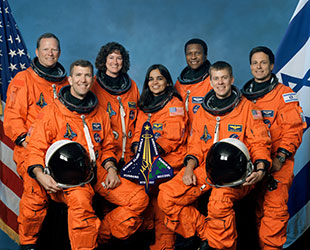 advertisements advertisements
|

|
STS-107 crew, Shuttle Columbia lost

The crew of STS-107: David Brown, Rick Husband, Laurel CLark, Kalpana Chawla, Michael Anderson, William McCool and Israeli payload special Ilan Ramon. (NASA) |
February 1, 2003 — The space shuttle Columbia and its seven astronauts were lost today when the vehicle broke up over north central Texas during its reentry from space.
Communications were lost with Columbia's crew at 9:00 a.m. ET, while the shuttle was traveling about 18 times the speed of sound at an altitude of 207,000 feet. They were 16 minutes from landing at Kennedy Space Center when flight controllers at mission control lost contact. Columbia was returning from a 16-day scientific research mission, its 28th space flight, launched on January 16.
On-board Columbia were commander Rick Husband on his second flight, pilot William McCool on his first flight, mission specialists Dave Brown, also completing his first mission, Kalpana Chawla, on her second flight, Laurel Clark, a first-time space traveler, payload commander Mike Anderson, ending his second flight, and payload specialist Ilan Ramon of the Israel Space Agency, on his first flight.
Prior to losing contact with Columbia, the shuttle's return appeared perfectly normal. After assessing some wispy fog near the shuttle's three-mile long landing strip at KSC before dawn, flight director Leroy Cain gave approval for the firing of the braking jets to begin Columbia's descent.
Husband and McCool began the deorbit burn to allow Columbia to slip out of orbit at 8:15 a.m. ET. There was no indication of anything abnormal with the reentry until the last transmission between controllers and the crew.
At the intended landing site, NASA Administrator Sean O'Keefe and Associate Administrator for Space Flight William Readdy met with the families of the astronauts to offer their condolences, vowed to uncover the cause of the accident and press ahead with the Shuttle program.
"This is indeed a tragic day for the NASA family, for the families of the astronauts who flew on STS-107, and likewise is tragic for the nation," said NASA's O'Keefe.
"We have no indication that the mishap was caused by anything or anyone on the ground," O'Keefe commented.
In a briefing, chief flight director Milt Heflin said that at 8:53 a.m. ET, controllers detected indications of a loss of hydraulic system temperature measurements that were associated with Columbia's left wing, followed three minutes later by an increase in temperatures on the left main gear tires and brakes. At 8:58 a.m., mission control noted a loss of bondline temperature sensor data in the area of the left wing followed a minute later by a loss of data on tire temperatures and pressures for the left tires.
After several attempts to try to contact Columbia, Cain declared a contingency, whereby flight controllers began preserving documentation regarding the entry phase of the flight. Recovery forces fanned out from Texas to Louisiana to try to recover debris that will be pertinent to the mishap investigation.
Program manager Ron Dittemore said that several teams have been organized to gather data for analysis and will report to an investigation board that was appointed by O'Keefe. Dittemore added that no specific orbiter debris or crew remains have been positively identified at this time, and that there is no leading theory for the cause of the accident.
Dittemore said the processing of other shuttles for future launches has been temporarily halted to enable engineers to review data and to focus attention on all pertinent information involving Columbia's prelaunch preparations. |

© 1999-2025 collectSPACE. All rights reserved.

|
|

|

|
